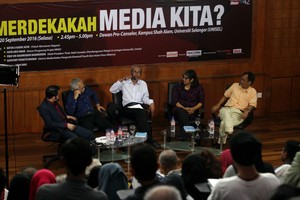Asia Region
Malaysia
On September 20, Malaysia’s Sinar Harian Forum welcomed 400 students and members of civil society to the University of Selangor on the Shah Alam campus to discuss media freedoms in Malaysia. Nine of the country’s media houses were in attendance, including The Star Online, Selangor TV, MalayMail Online and Sinar Harian. Among the panel of speakers were former New Straits Times group editor-in-chief A. Kadir Jasin, Projek MMO editor Fathi Aris Omar, media activist Gayathry Venkiteswaran, and University of Selangor Dean of Communication, Visual Arts and Computing Prof. Dr. Azmuddin Ibrahim.
The panel led discussions on the level of media repression present in Malaysia as well as the amendment to the country’s Communications and Multimedia Act. They said the government had too much control over the media and that media outlets that didn’t align their views with the government were often subjected to restrictions under existing press laws. With several panel members ranking Malaysia’s press freedom at a three or four out of 10, many discussed setting up a press council as a way to tackle media repression in the country.
Indonesia
Media freedom in Papua is becoming a growing concern for journalists in Indonesia. Foreign journalists must obtain a special permit to enter the area, while local journalists must go through the police to cover a story. In addition to the repressive actions taken against the media – which has a direct effect on news coverage – human rights abuses abound in Papua. According to the International Coalition for Papua, there were 881 political prisoners in Papua in 2015 who have never been able to take their case to court.
In order to report the latest in press freedom from the region, ten journalists from nine media outlets working within WAN-IFRA’s “Strengthening Media and Society Programme” will head to Papua in January. The reporters will be split into small groups, visiting Jayapura, Merauke and Timika, before coming together in Jakarta to share their experiences with speakers from the Indonesian press council and the Jakarta Foreign Correspondent Club.
Africa region
South Africa’s universities have been plagued by student protests in recent months, as demonstrators call for free education for all. While many South Africans are in favor of free education – at least for poor students – the protests have become more violent recently, making reporting on the incidents a challenge for local journalists. Members of WAN-IFRA’s Media Freedom Committee in South Africa have heard reports of journalists being chased off campus, not allowed to take photos or asked to remove photos. The backlash has spilled over into community protests, putting some journalists’ safety at risk while covering local events.
South Africa’s MFC has responded by putting together an action plan to tackle the safety and security challenges facing journalists during these protests. At the beginning of 2017, the team plans to host a Digital Security Training in Johannesburg. They’re also putting together teams to lead action plans on Safety of Journalists, Building Public Trust, and General research on salaries and working conditions, where participants will focus on gender and race disparities.
Latin America region
In honor of the International Day to End Impunity for Crimes Against Journalists, WAN-IFRA organized its first Media Freedom panel as part of its Strengthening Media and Society programme in Latin America. Held in Mexico on November 10, the goal of the discussions was to address the censorship journalists in the country face as well as the methods used to intimidate and harass. The panel focused on four of these methods: economic pressure, digital hacking or spying, government harassment and physical aggression.
The panel found that government advertizing was being used as an indirect form of censorship. They said that the lack of rules, transparency and accountability in how governments at all levels spend money on advertizing allows public officials to not exercise control over the media. Journalists are also falling victim to digital hacking, where phishing schemes use software to read journalists’ emails, text messages and stores files. Often, hackers look to access this information to gain knowledge of journalists’ sources, communications with editors and stories in progress.
Journalists in Mexico also risk government harassment, which can come in the form several forms. In the Sinaloa state, the government imposed a gag rule that prohibited news organizations from publishing information about crime. The government also uses fiscal audits, bogus lawsuits that tie media companies up in long litigation or drain their resources, and smear campaigns against journalists who are critical of the government.
The physical violence that journalists experience is often tied to government harassment. The panel pointed out that 49 percent of attacks against journalists were from local government officials. The highest risk for journalists, though, remains threats from organized criminal networks in the form of murder, kidnapping and armed attack.
As the group looks to the future, they plan to promote transparency, particularly in regards to government advertizing, and are hoping for a change in political culture so that public officials can eventually learn the importance of a free press.




